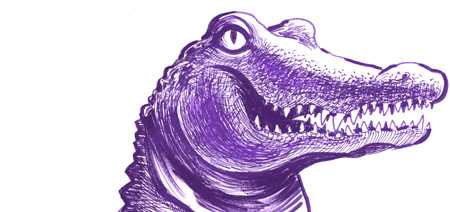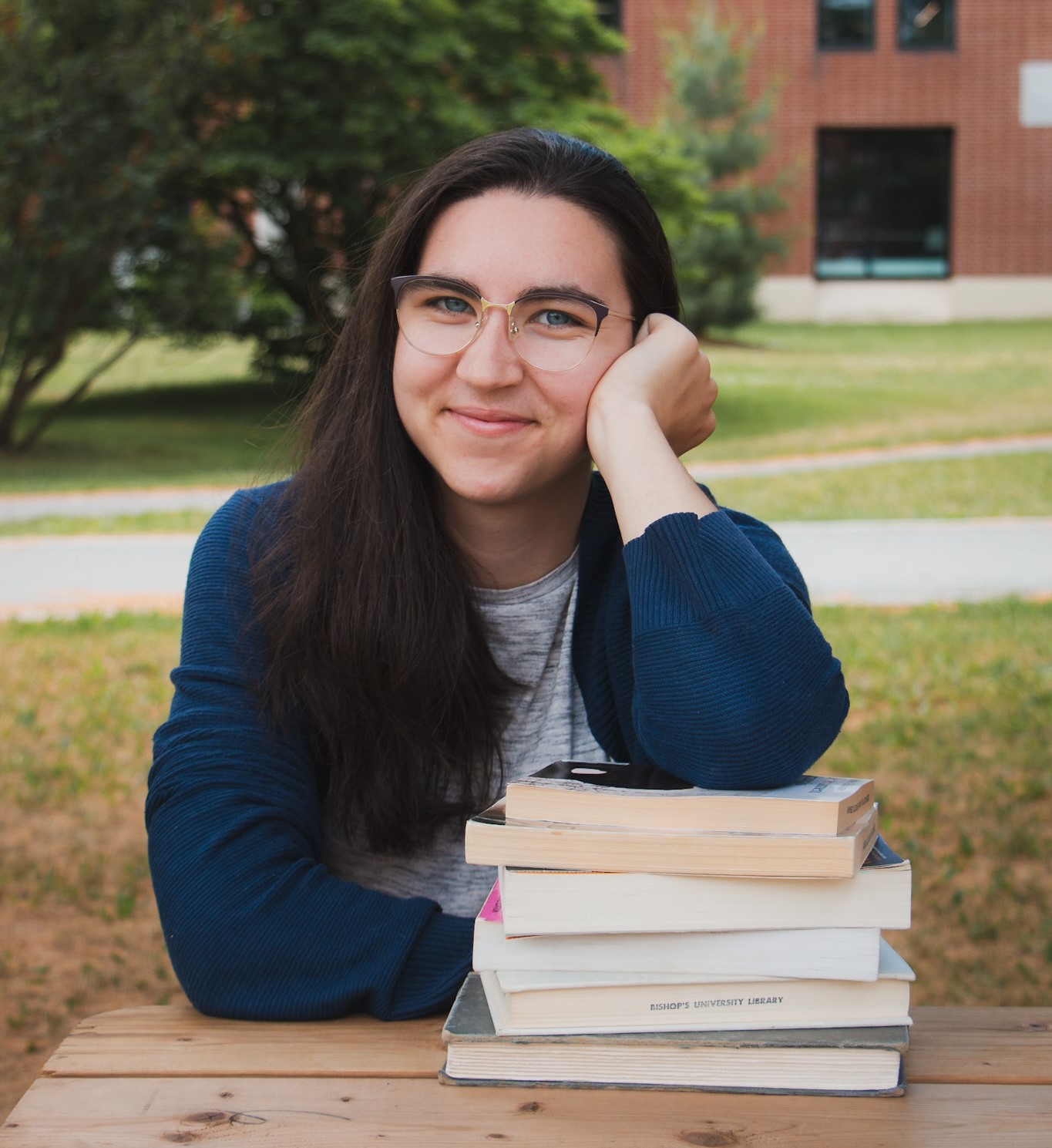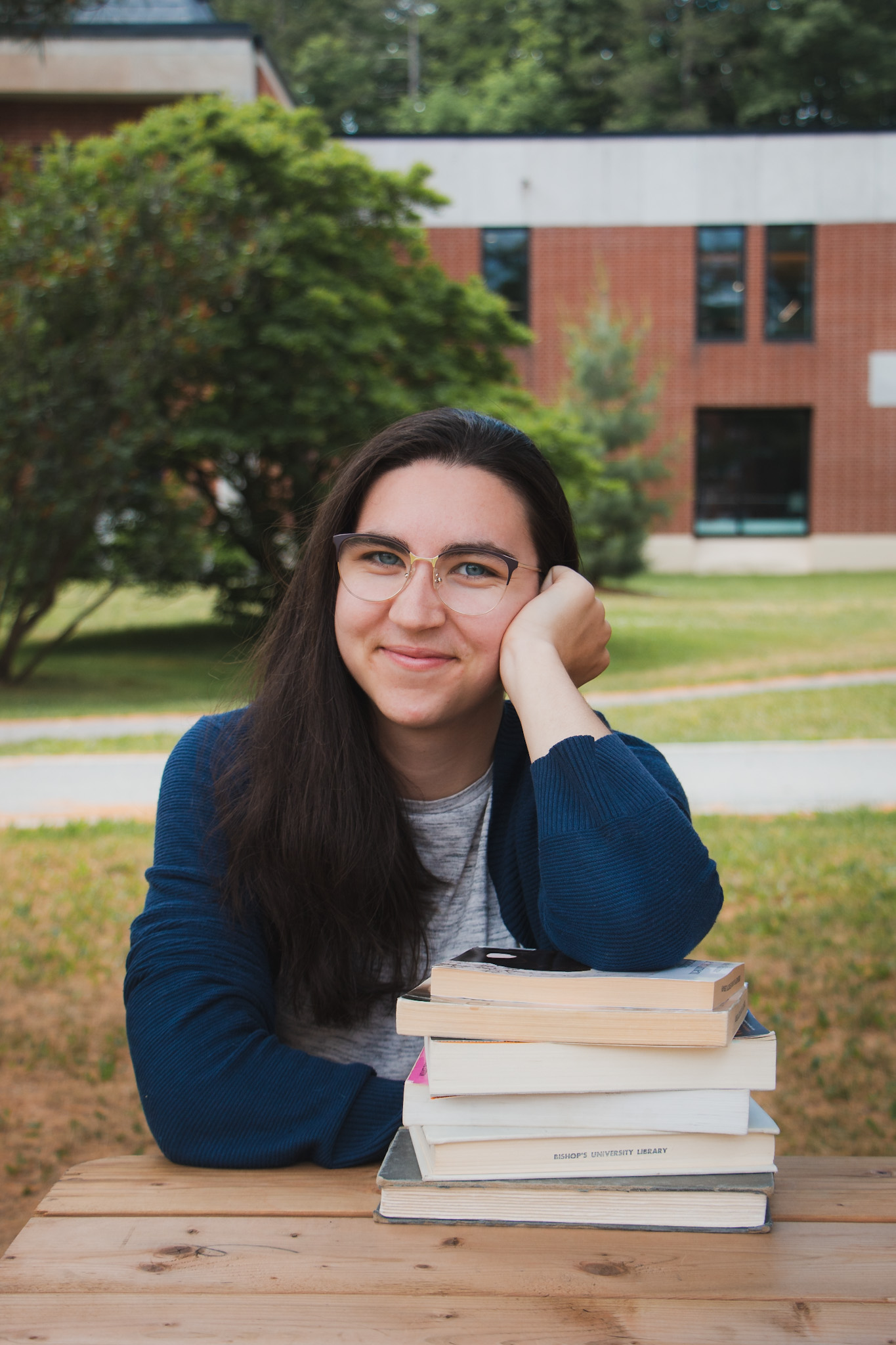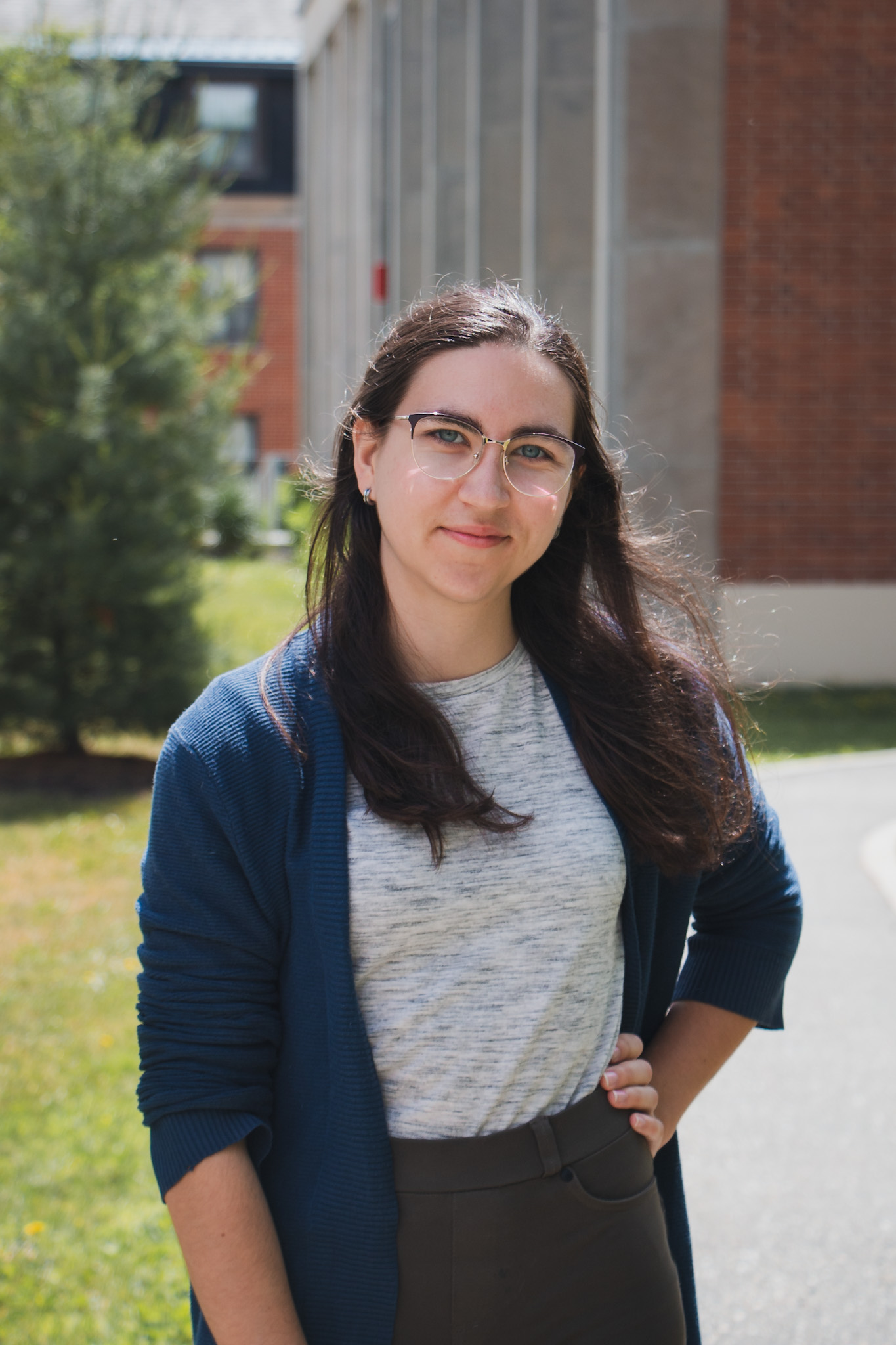‘Experiential learning will increasingly become a critical pedagogical component of the student’s experience here at UBishops. Providing opportunities for students to work in their field of study is invaluable for them to get hands on experience and apply their learning. Incorporating and devising experiential opportunities for students of all levels and in all fields is an exciting challenge.’
–Dr. Claire Grogan, Associate VP Academic.
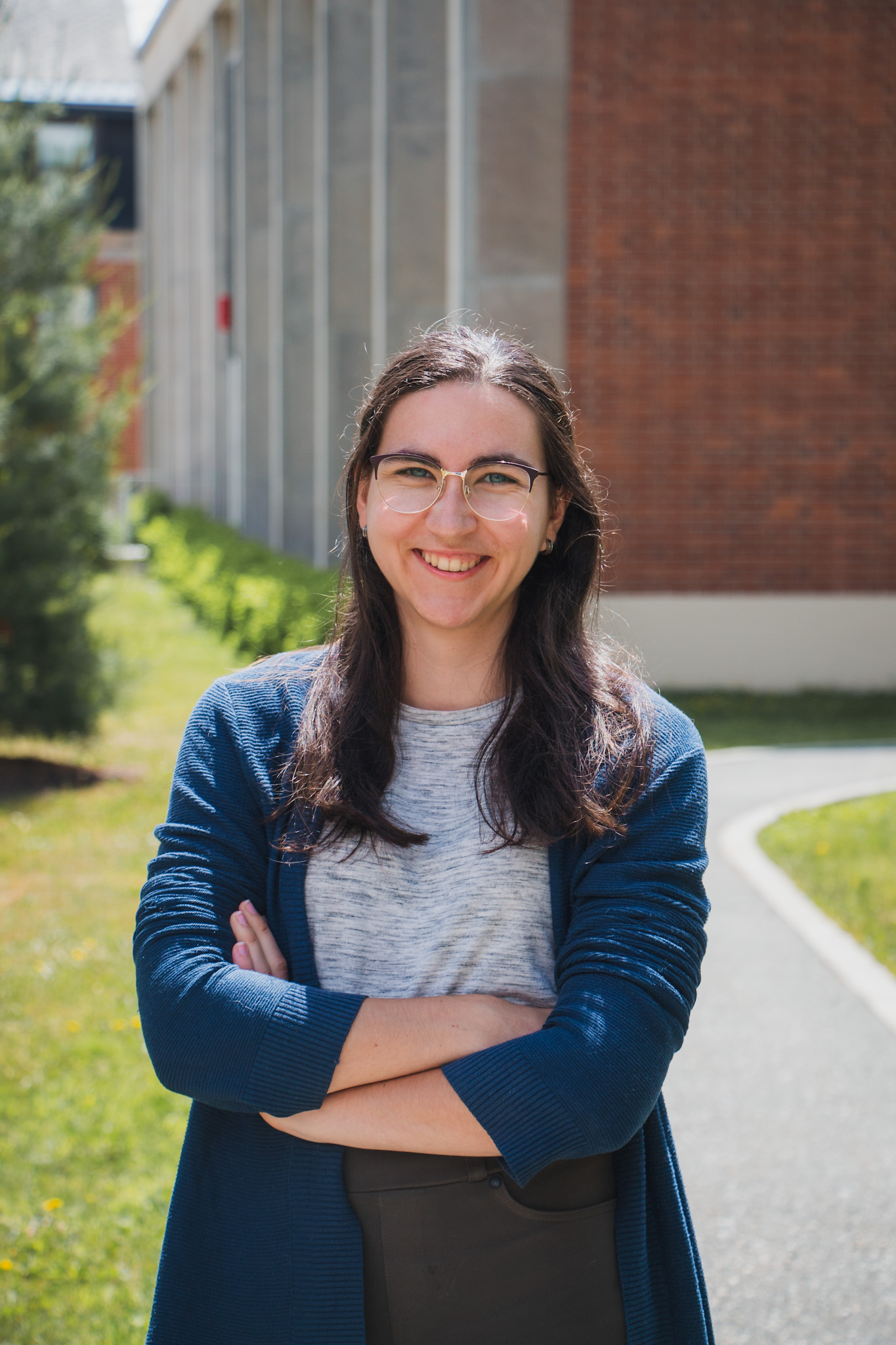
Cécilia Alain is a fourth-year student who is currently finishing her English B.A. with an Honours in Film and Minors in Creative Writing and Fine Arts. She is also currently working as a research assistant for Dr. Jessica Riddell of the English department.
Cécilia started her studies at Bishop’s in the Fall of 2018. In Cégep, she explains, she was terrified of going to a big university until a councillor proposed Bishop’s. “I was from Sherbrooke, and I had no idea this place existed, so I visited with my dad and fell in love with this beautiful building.” She points at McGreer standing in front of us. “I loved the place, and I loved the size. And I still love it.”
The small size of the school is indeed often an attraction for students, and the size of the Film program never constrained Cécilia’s possibilities. “There’s a certain variety in the program. I got to learn about international films and the technicality of screenwriting and then I got some different angles: with the drama department I got to touch costume design; I had a bit of scenography as well. I can go in directions I hadn’t expected. It is still a small program in the grand scheme of how cinema can be taught, but I’m impressed by how many ramifications I can get.” She ascribes that flexibility to the liberal model of education offered here at Bishop’s. “That part is just magical, because I get to put my hands all over the place (…) I’ve taken a lot of courses outside of my program, (…) but it’s still, in my opinion, extremely relevant to the things I study—and to me as a person, as well. Like right now, I’m doing fine arts courses and it’s completely unrelated to cinema, but in a certain way, it still is. It’s all connected.” In fact, Cécilia submitted three animated films for BUFF over the course of her studies here, successfully mixing her interests in cinema with her talents in fine arts, and won an award on all three occasions.
Apart from the program’s flexibility, the courses themselves offer various possibilities. It is, in fact, through one of her courses that she got the chance to work as a research assistant. “I did Shakespearience with Dr. Riddell in 2019 … It’s basically the only course I actually took with her. And it’s funny because that’s an intensive course. So, I met her for like seven days, and she was like, ‘I wanna work with you’!”
Cécilia has now been Dr. Riddell’s research assistant since June 2020. She has worked on various projects: doing research and transcriptions, building a website, helping on a podcast as a technical producer, and more. This summer, however, she remains mostly focused on one project. “I mainly help [Riddell] finish her book manuscript for a book called Shakespeare’s Guide to Critical Hope and Empathy: Conversations About Teaching and Learning in the 21st Century.” The book consists of a series of essays in collaboration with Riddell’s two ‘Wyrd’ sisters, Dr. Shannon Murray from the University of Prince Edward Island and Dr. Lisa Dickson from the University of Northern British Columbia (UNBC). “My job was to go through all the references that they make of Shakespeare to check all the lines to make sure that all page numbers are correct … I went through those four Shakespeare books back and forth to find all the lines and makes sure all the comments are in the right place and all the spelling is right, according to the right editions … I did the bibliography then: I connected every time they cite, or they name somebody, I was tracking down the resources, scouting through the internet to figure out who that person is and when did they say that and how. Just making sure everything is in order. I also did an annotated bibliography where they suggest resources for teachers and educators teaching Shakespeare, mostly for higher education.” Although she carries different tasks, she adds that if she had to pick a title to summarize her role at the moment, she would mostly describe herself as a copyeditor.
Her position helps her in other areas of her life as well. As her work is usually remote and flexible, she gets to plan her own schedule, giving her more time to do what she loves while practicing her organizational skills. “I get to structure my work by myself and that’s really helpful.” She notices that her research skills have also improved. “Yes, we get to do bibliographies for our English essays, but we have like three or four resources to find; now I have six pages of resources… Doing the process over and over and over again really forged the method in me, now I can do it very easily. I have a keener eye for research as well because that’s my job to search if the resource is legit.” In her next courses, she realized she was much faster and effective in her research. “It’s learning by doing and that’s the best way to remember it efficiently.” She adds that, for her, experiential learning is “priceless.” “You get to use it, not just for a job, it’s a little vague, but… you grow as a human being … I’m sure, no matter where I head in my career in the future, I’m sure it’s gonna end up relevant.” Not only does it prepare her for the future, but it also helps her every day. “It gives me confidence because I get to say, wow, I’m able to do that … If me, as an undergrad, can do that, what does the future hold?” Another crucial point is that her work is rewarded financially. “As a student, it’s very important because you’re offered so many great [unpaid opportunities]: it’s great, it’s experience, but getting paid helps relieve the stress of being a student, and again, shows that your work matters and what you do is important.” In her current work, this value is currently concretized in a visual format, which brings her pride. “I get to see that my work has meaning, because it’s gonna make a book! I can see that book coming to life and I’m like, wow, I put my hands in it, I participated in that.”
Though most of her work can be done from home, Alain still likes to come on campus throughout the summer, either for her art classes, to read in the grass, or to work. “I love to see the campus in the summer … You feel like you have the place to yourself. The library is so quiet.” She adds, “we tend to just rush and pass by those things because we’re busy with school but in the summer, you get to slow down, have a picnic and just enjoy the place.”
During her free time, Cécilia likes to explore the rest of the Eastern Townships, especially Magog’s beach. She also urges other students in the region to explore Stanstead for fruit picking and for its bakery and to go see Coaticook’s park La Gorge, if only to have an excuse to get ice cream on the way back.
When asked what she plans to do after graduation, Cécilia laughs: “That’s such a scary question! I’ll go with the flow. I’ll see what presents itself.” She adds that she would love to do something creative. “I’ve always been interested in so many things … I know that cinema still really interests me, so hopefully I’ll go into cinema. And I know that what I’ve done is going to be relevant, no matter where I head, because it’s gonna be in my back pocket… In a whole bag, in fact. It’s loaded.”
Go to our website to learn more about the English program and experiential learning: https://www.ubishops.ca/academic-programs/faculty-of-arts-and-science/humanities/english/ https://www.ubishops.ca/academic-programs/bu-liberal-education-model/experiential-learning/

